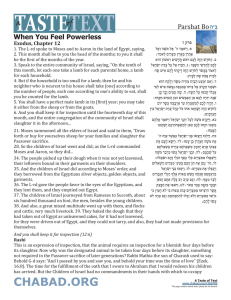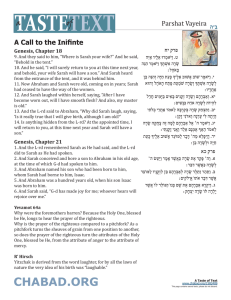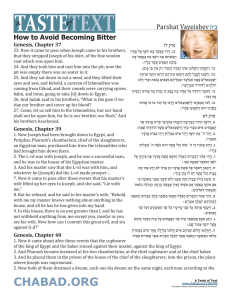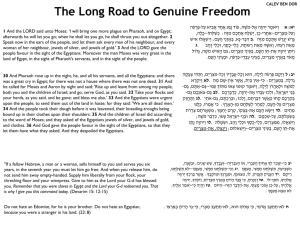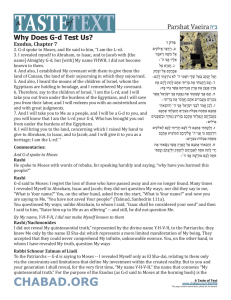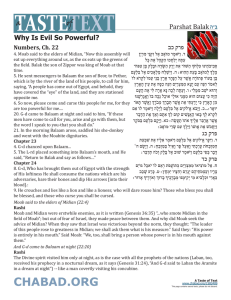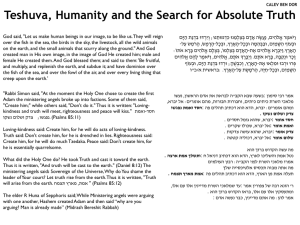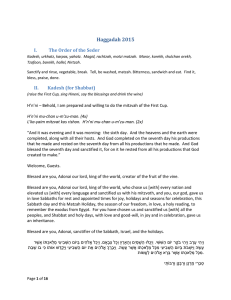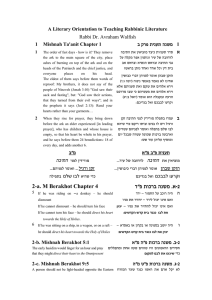TASTE TEXT of a
advertisement
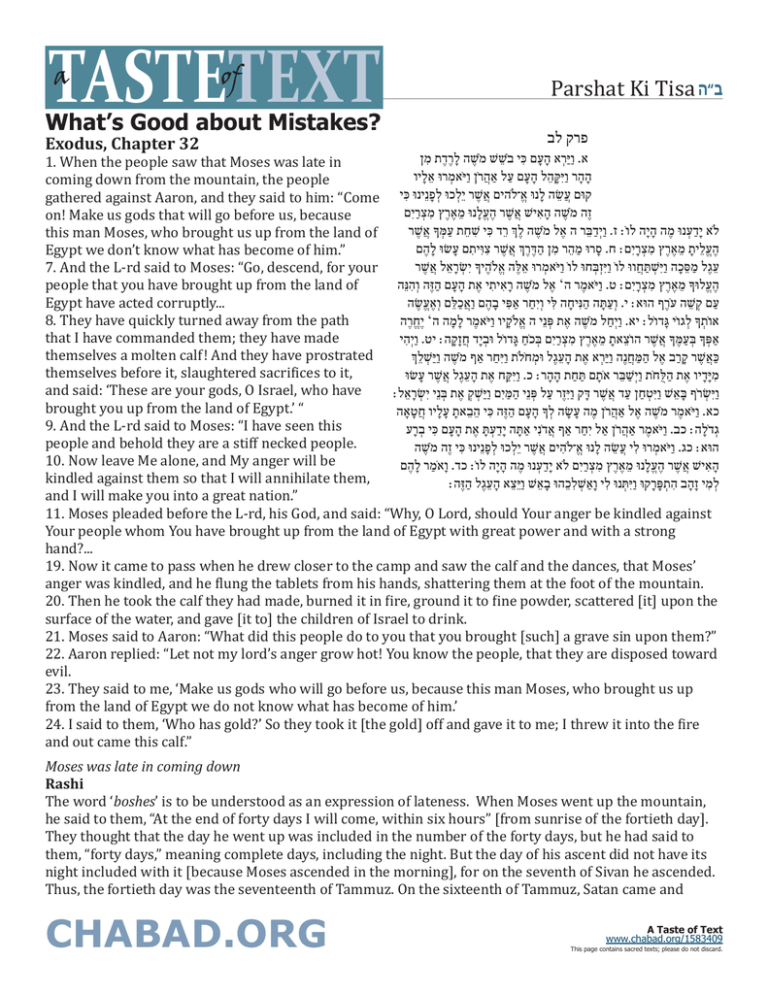
TASTETEXT a of What’s Good about Mistakes? Exodus, Chapter 32 Parshat Ki Tisa ב”ה פרק לב ַוּיַרְ א הָ עָ ם ּכִ י ב ֹׁשֵ ׁש מ ֹׁשֶ ה לָ רֶדֶ ת ִמן.א 1. When the people saw that Moses was late in ֹאמרּו אֵ לָ יו ְ הָ הָ ר ַוּיִּקָ הֵ ל הָ עָ ם עַ ל ַא ֲהר ֹן ַוּי coming down from the mountain, the people י ִּכ ֵינּו נ ָפ ְל כּו ְקּום עֲׂשֵ ה לָ נּו אֱ־ֹלהים אֲׁשֶ ר יֵל gathered against Aaron, and they said to him: “Come זֶה מ ֹׁשֶ ה הָ אִ יׁש אֲׁשֶ ר הֶ עֱלָ נּו מֵ אֶ רֶץ ִמצְ ַריִם on! Make us gods that will go before us, because ַויְדַ ּבֵ ר ה אֶ ל מ ֹׁשֶ ה לֶ ְך רֵד ּכִ י ִׁשחֵ ת עַ ְּמָך אֲׁשֶ ר. ז:ֹ ֹלא יָדַ עְ נּו מֶ ה הָ יָה לו this man Moses, who brought us up from the land of סָ רּו מַ הֵ ר ִמן הַ ּדֶ רְֶך אֲׁשֶ ר צִ ִּויתִ ם עָ ׂשּו לָ הֶ ם. ח:הֶ עֱלֵ יתָ מֵ אֶ רֶץ ִמצְ ָריִם Egypt we don’t know what has become of him.” ֹאמרּו אֵ ּלֶ ה אֱֹלהֶ יָך י ְִׂשרָאֵ ל אֲׁשֶ ר ְ עֵ גֶל מַ ּסֵ כָ ה ַוּי ְִׁשּתַ חֲוּו לו ֹ ַו ִּיזְּבְ חּו לו ֹ ַוּי 7. And the L-rd said to Moses: “Go, descend, for your ַוּי ֹאמֶ ר ה’ אֶ ל מ ֹׁשֶ ה רָאִ יתִ י אֶ ת הָ עָ ם הַ ּזֶה וְ הִ ּנֵה. ט:הֶ עֱלּוָך מֵ אֶ רֶץ ִמצְ ָריִם people that you have brought up from the land of וְעַ ּתָ ה הַ ּנִיחָ ה ּלִ י וְ יִחַ ר אַ ּפִ י בָ הֶ ם ַואֲכַ ּלֵ ם ְואֶ עֱׂשֶ ה. י:עַ ם קְ ׁשֵ ה עֹרֶף הּוא Egypt have acted corruptly... ַויְחַ ל מ ֹׁשֶ ה אֶ ת ּפְ נֵי ה אֱֹלקָ יו ַוּי ֹאמֶ ר לָ מָ ה ה’ ֶי ֱחרֶה. יא:או ֹתְ ָך לְ גו ֹי ּגָדו ֹל 8. They have quickly turned away from the path that I have commanded them; they have made ַויְהִ י. יט:אַ ּפְ ָך ּבְ עַ ּמֶ ָך אֲׁשֶ ר הו ֹצֵ אתָ מֵ אֶ רֶץ ִמצְ ַריִם ּבְ כ ֹחַ ּגָדו ֹל ּובְ יָד ֲחזָקָ ה themselves a molten calf! And they have prostrated ּומח ֹֹלת ַוּיִחַ ר ַאף מ ֹׁשֶ ה ַוּי ְַׁשלֵ ְך ְ ּכַ אֲׁשֶ ר קָ רַב אֶ ל הַ ּמַ ֲחנֶה ַוּיַרְ א אֶ ת הָ עֵ גֶל themselves before it, slaughtered sacrifices to it, ַוּיִּקַ ח אֶ ת הָ עֵ גֶל אֲׁשֶ ר עָ ׂשּו. כ:ִמּיָדָ יו אֶ ת הַ ֻּלח ֹת ַויְׁשַ ּבֵ ר א ֹתָ ם ּתַ חַ ת הָ הָ ר and said: ‘These are your gods, O Israel, who have :ַוּי ְִׂשר ֹף ּבָ אֵ ׁש ַוּי ְִטחַ ן עַ ד אֲׁשֶ ר ּדָ ק ַו ִּיזֶר עַ ל ּפְ נֵי הַ ּמַ יִם ַוּי ְַׁשקְ אֶ ת ּבְ נֵי י ְִׂשרָאֵ ל brought you up from the land of Egypt.’ “ ַוּי ֹאמֶ ר מ ֹׁשֶ ה אֶ ל ַא ֲהר ֹן מֶ ה עָ ׂשָ ה לְ ָך הָ עָ ם הַ ּזֶה ּכִ י הֵ בֵ אתָ עָ לָ יו חֲטָ ָאה.כא 9. And the L-rd said to Moses: “I have seen this ַוּי ֹאמֶ ר ַא ֲהר ֹן ַאל יִחַ ר ַאף ֲאד ֹ ִני אַ ּתָ ה יָדַ עְ ּתָ אֶ ת הָ עָ ם ּכִ י בְ רָע. כב:גְ ד ֹלָ ה people and behold they are a stiff necked people. ֹאמרּו לִ י עֲׂשֵ ה לָ נּו אֱ־ֹלהִ ים אֲׁשֶ ר יֵלְ כּו לְ פָ נֵינּו ּכִ י זֶה מ ֹׁשֶ ה ְ ַוּי. כג:הּוא 10. Now leave Me alone, and My anger will be ָוא ֹמַ ר לָ הֶ ם. כד:ֹ הָ אִ יׁש אֲׁשֶ ר הֶ עֱלָ נּו מֵ אֶ רֶץ ִמצְ ַריִם ֹלא יָדַ עְ נּו מֶ ה הָ יָה לו kindled against them so that I will annihilate them, :לְ ִמי זָהָ ב הִ תְ ּפָ רָקּו ַוּיִּתְ נּו לִ י וָאַ ְׁשלִ כֵ הּו בָ אֵ ׁש ַוּיֵצֵ א הָ עֵ גֶל הַ ּזֶה and I will make you into a great nation.” 11. Moses pleaded before the L-rd, his God, and said: “Why, O Lord, should Your anger be kindled against Your people whom You have brought up from the land of Egypt with great power and with a strong hand?... 19. Now it came to pass when he drew closer to the camp and saw the calf and the dances, that Moses’ anger was kindled, and he flung the tablets from his hands, shattering them at the foot of the mountain. 20. Then he took the calf they had made, burned it in fire, ground it to fine powder, scattered [it] upon the surface of the water, and gave [it to] the children of Israel to drink. 21. Moses said to Aaron: “What did this people do to you that you brought [such] a grave sin upon them?” 22. Aaron replied: “Let not my lord’s anger grow hot! You know the people, that they are disposed toward evil. 23. They said to me, ‘Make us gods who will go before us, because this man Moses, who brought us up from the land of Egypt we do not know what has become of him.’ 24. I said to them, ‘Who has gold?’ So they took it [the gold] off and gave it to me; I threw it into the fire and out came this calf.” Moses was late in coming down Rashi The word ‘boshes’ is to be understood as an expression of lateness. When Moses went up the mountain, he said to them, “At the end of forty days I will come, within six hours” [from sunrise of the fortieth day]. They thought that the day he went up was included in the number of the forty days, but he had said to them, “forty days,” meaning complete days, including the night. But the day of his ascent did not have its night included with it [because Moses ascended in the morning], for on the seventh of Sivan he ascended. Thus, the fortieth day was the seventeenth of Tammuz. On the sixteenth of Tammuz, Satan came and CHABAD.ORG A Taste of Text www.chabad.org/1583409 This page contains sacred texts; please do not discard. TASTETEXT a of ב”ה brought confusion into the world and showed a semblance of darkness, pitch darkness, and confusion, indicating that Moses had surely died and therefore, confusion had come upon the world. Satan said to them, “Moses has died, for six hours have already passed, and he has not come, etc.,” Because this man Moses Rashi Satan showed them something resembling Moses, being carried in the air, high above in the sky. Talmud, Sanhedrin 102 There is no misfortune that doesn’t have in it something of the sin of the golden calf. Midrash Rabba Ex. 46:1 G-d said to Moses: Do not be distressed over the first tablets which contained only the Ten Commandments. In the second tablets, I am giving you also Halacha, Midrash and Aggada....Had Israel not sinned with the golden calf, they would have received only the five books of Moses and the book of Joshua. Why? Because, as the verse says, “Much wisdom comes through much grief.” Talmud, Avoda Zara 4b-5a Israel was not capable of committing such an act. The whole affair was G-d’s decree in order to set a precedent for the penitent. The Rebbe Repentance makes it possible to forge a greater connection with G-d. Before sinning, an individual’s relationship with G-d need only be strong enough to keep him on track. Once he sins, however, he is confronted with the realization that the enticement of the sin meant more to him than his commitment to G-d. He must therefore delve into himself in order to find a place where G-d means more to him than the pleasure of this indulgence. If the teshuvah is real, he will have reached a place within himself where his relationship and commitment to G-d are now so strong that he will no longer be able to commit the sin he is he repenting from, resulting in a deeper bond between him and G-d. Tissa The idiomatic meaning is “when you take the census of the Israelites” but literally, these words mean “when you raise up.” The entire contents of the parshah are a process through which the Jewish people would not have become elevated otherwise. SUMMARY • The purpose of the sin of the golden calf was to provide an example of repentance for wrongdoers to follow and to enable humanity to rise to the heights of spiritual achievement only attainable through repentance. • In a relationship, when one partner betrays or disappoints the other, for reconciliation to occur they must reach a place within themselves where the relationship means more to them than any infringement of it. Their relationship demonstrates that “we are so connected to each other that you mean more to me than whatever is was that you did.” • Teshuvah is our capacity to reclaim the deficiencies of the past as fuel and momentum for the attainment of new, unprecedented heights. Teshuvah teaches us that every failing, every decline, can be exploited and redirected as a positive force. CHABAD.ORG A Taste of Text www.chabad.org/1583409 This page contains sacred texts; please do not discard.
